Modern society brings with it many challenges and information technologists have and are key contributors to solving some of these most prescient tests systematically through the use of computer programming, implentation of big data and their progressive thinking.
There is no doubt that information technology has changed the way we live, most fundamentally through the development of computers, the internet and mobile phones but also in government policy, defence, travel and medicine, the latter of which is explored in our Tech for Good feature.
These interventions also include, as you’ll see below, positive benefits to the way our society manages social security, health, the climate crisis, transport, sustainability, crime prevention and the overall well-being of the nation.
At Archives of IT (AIT) we aim to capture the past and inspire the future but more than that we are doing this together with the people who are at the forefront of change.
In 2024 AIT interviewed four pioneers who have enabled change and in this article we focus on their key contributions to society and also look at two previous interviews from 2021 and 2022 with entreprenuers who have actively positioned their skills and careers for the benefit of society.
Developing a computerised system for Social Security
Professor Nigel Gilbert CBE, interviewed on 2 February 2024
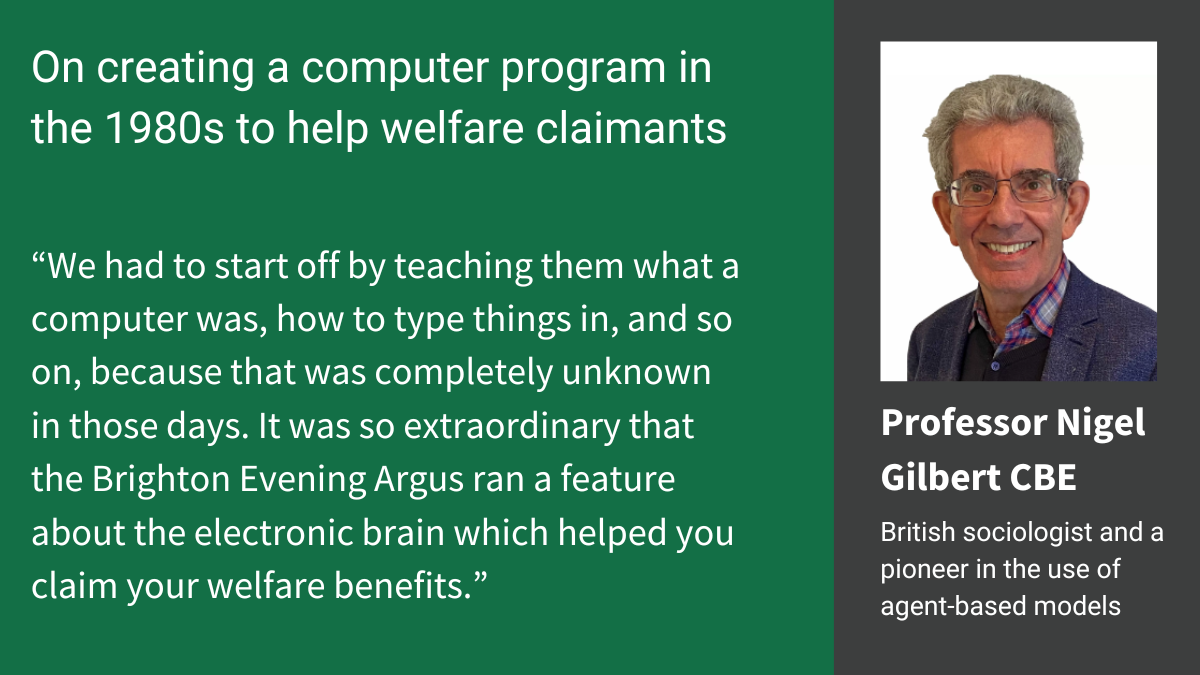
Professor Nigel Gilbert is a social scientist and polymath and one of the founders of modern computational sociology, a discipline that merges social science research with simulation techniques with the goal of modelling complex policy issues and fundamental aspects of human societies.
He is currently a distinguished chair in Computational Social Science at the University of Surrey where he is also founder and director of the Centre for Research in Social Simulation and sits on numerous government advisory boards.
Prof Gilbert joined the University of Surrey in 1977 and in 1984 he created a computer program to overcome the difficulties for individuals in calculating their welfare benefits. The idea came from a discussion in the Department of Sociology and to help him write the program, Nigel applied for a grant from the university to purchase a microcomputer.
He says: “It was a North Star Horizon microcomputer which had a Z80 chip in it and two five and a quarter inch floppy disks, all in a wooden box. This was basically the reason why I wanted to do this, because I really wanted a microcomputer. In today’s money, it was worth about £15,000, much more than a lecturer could afford.
“So I proudly got a microcomputer. I wrote a program to do the job, and we took it to a portacabin in Brighton to try get some real members of the public — some real claimants — to use it.
“We had to start off by teaching them what a computer was, how to type things in, and so on, because that was completely unknown in those days. It was so extraordinary that the Brighton Evening Argus ran a feature about the electronic brain which helped you claim your welfare benefits. The Guardian saw the feature and carried it on the front page, so I was nationally famous.”
After the success of his program, Dr Gilbert was invited to a meeting with Lynda Chalker, the then Minister for Social Security.
The Alvey Programme
At the same time the Alvey programme (see more about this in our Human Computer Interaction feature) was established as a British government sponsored research programme in information technology that ran from 1984 to 1990. “The government had given the Alvey Programme a fairly substantial amount of money [£350m: £200 from government and £150m from industry] and said that this should be used to fund five grand challenges, one of which was to help with the administration of social security.”
International Computers Limited (ICL) invited a number of academics, including Prof Gilbert, to join a bid to undertake this challenge, which was known as The Alvey DHSS Demonstrator Project.
“They asked me to develop a more sophisticated version of the program that I’d written on my microcomputer. ICL won the bid and I found myself with a research grant from them for three-quarters of a million pounds to do this over five years.”
The project lasted five years and Nigel had six researchers working with him. “This whole project was based on using Xerox Lisp machines, so the project bought about a dozen of these things and we wrote our programs in Lisp, Interlisp. These were amazing machines at the time, because they had a graphical input. The screen had about a million pixels on them, which in those days was extraordinary.”

Now this might not be altruism in its truest form, however, getting a new computer aside, this project did lead to a successful career for Dr Gilbert in solving more of society’s challenges and he has since successfully managed many multi million pound projects using innovative computational methodologies, applied to socio-environmental issues.
Following the Alvey DHSS project he went on to become Pro-Vice Chancellor of the University of Surrey and sits on numerous research council advisory boards. He has founded two online academic journals and has a long list of publications.
The Journal of Artificial Societies and Social Simulation, founded in 1998, for example, is an interdisciplinary journal for the exploration and understanding of social processes by means of computer simulation and agent-based modelling with its own leaned society, the European Association of Social Simulation. By 2000, the number of researchers doing social simulation had grown from 20 to more than 10,000.
Dr Gilbert is also the Director of CECAN, the Centre for Evaluation of Complexity Across the Nexus, a £3m research centre hosted by the University of Surrey, which brings together a unique coalition of experts to address some of the greatest issues in policy making and evaluation including government policy.
Helping vulnerable people in the community
Pamela Cook, interviewed in August 2021
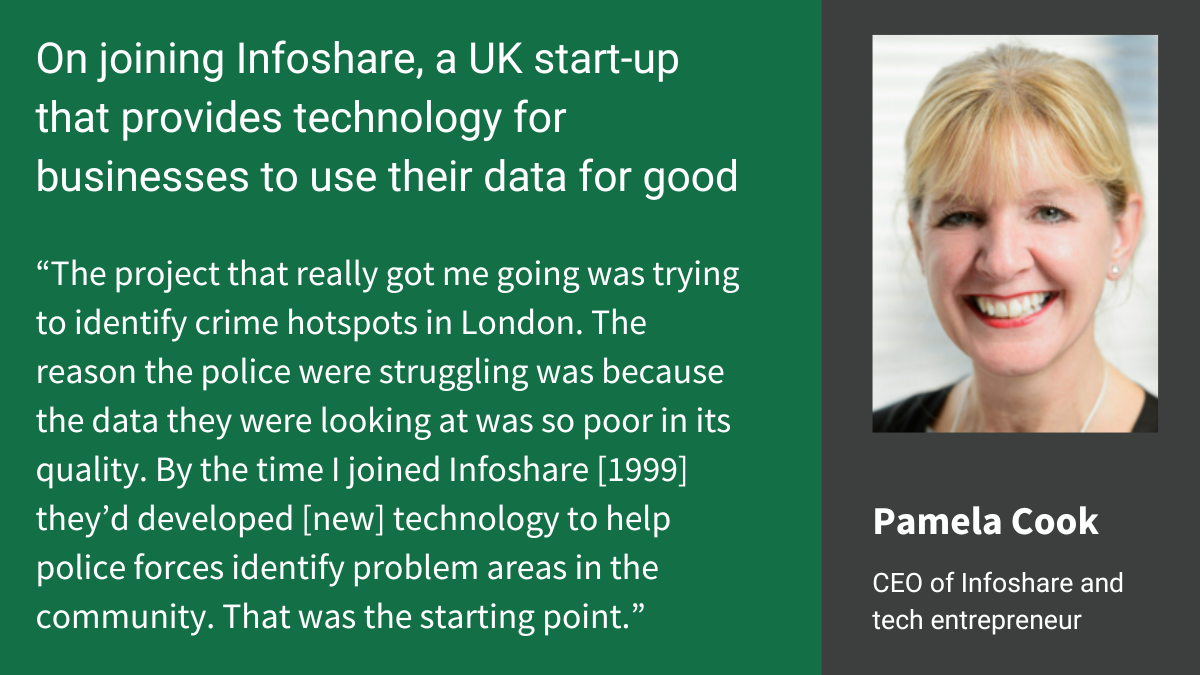
In 1999 entrepreneur Pamela Cook joined Infoshare from a career in gaming. Infoshare is a UK start-up, which for the past 25 years has helped public and private sector organisations identify vulnerable people within their disparate data, including children at risk and crime victims, to fast track the vital support and interventions they need.
“The company helps businesses use their data for good by using its technology for good,” she says.
She explains the move: “Being in computer games for so long was terrific, it was B2B business, it was very successful, easy and well paid. It was almost a breeze, but I felt something lacking. It wasn’t vacuous as such, but it was meaningless and I really wanted to work for an organisation where it actually made a positive difference to people’s lives, as opposed to providing entertainment in their living room or bedroom.
“When I was speaking to the founders [her two brothers] of Infoshare, and I realised that what they were trying to do was use data for good, it actually struck a real chord inside me in so much that I joined them. It was probably half the salary that I had been on and was a risk into the unknown. I think I was employee number three or four, at the time.
“It was a real start-up business. But I just felt, there was something that was burning in my belly that said this is a good thing, this is where you’ll do something where people will really benefit in the community. It just struck a chord so I threw my lot in with them.
“The project that really got me going was trying to identify crime hotspots in a part of London. The reason the police were struggling was because the data they were looking at, which was from different data sources, whether that was local authority or fire or police, was so poor in its quality that they were struggling to identify where their real crime hotspots were.
“By the time I joined Infoshare they had already developed the first throes of the technology which would help those police forces and those local authorities identify problem areas in the community. That was the starting point.”
In the first ten years, Infoshare sold desktop solutions and Pamela went out as a rep on the road. “It worked because it was saving money, it was proven, and also there was good funding from Government for what was called Crime and Disorder Reduction Partnerships.”
In 2008 Pamela became CEO of Infoshare and wanted to take the company to the next stage and after experiencing gender descrimination with potential funders took matters into her own hands by re-mortgaging her house to raise the necessary funds.
“That’s when I took over the business rather than being a rep. Since then, I’ve been doing the dual role of CEO and getting involved in the sales process.”
In the past decade Pamela says that the company has secured some great opportunities: “A lot of the investment that I put in went into developing the product so that we were scalable and flexible. We had been very restricted to desktop, so we made an enterprise version of the solutions that we provide, and we established some fantastic partnerships in the industry, the key suppliers to Government in particular.”
As well as this and the police they also work local authority and NHS and Royal Mail.
“We are able to scale up to 300 million records a night in processing, and that’s been probably the biggest achievement, because we were head-to-head with a major global corporation to get that piece of business. It was a real validation that, everything we had believed in, everything that we had put our investment in, had proven to be worthwhile.
“That also fed into the SME business that I’m involved in with the Cabinet Office. If you really do fight hard, and you really do put a good story forward, you can get heard.”
Identifying how society has benefitted from the work Pamela and Infoshare have done she says: “Society has benefited only in so much that our clients have been able to identify or solve more crimes; identify vulnerable citizens, identify and support children at risk. We’ve had many, many examples where lives have been saved as a result of the knowledge about them.
“It’s the sharing of that information from a community perspective that enables people to be supported in a much more targeted strategic fashion than the scattergun approach that has previously been applied. I think that’s the biggest outcome.”
Systems Thinking and the importance of a Digital Twin
Mark Enzer OBE, interviewed in February 2024
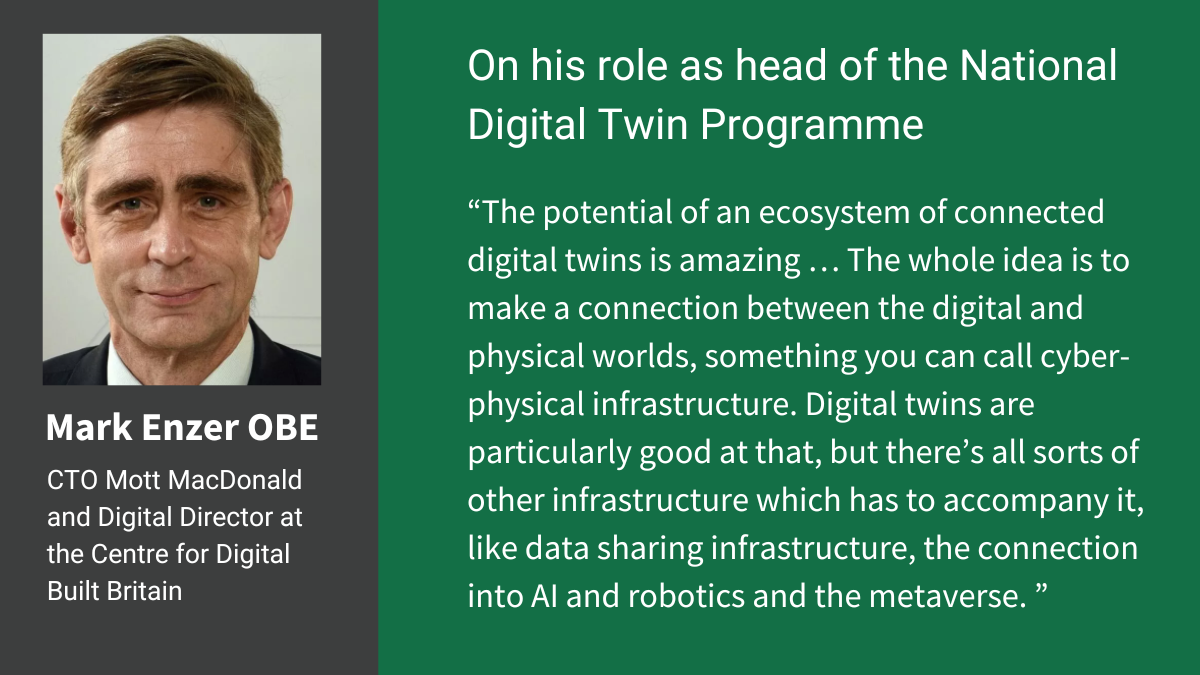
Mark Enzer OBE, is a British engineer and the CTO of consultancy Mott MacDonald and former head of the National Digital Twin Programme at the Centre for Digital Built Britain.
He studied an MA in Engineering Science at Pembroke College, Oxford University and it was during a year out with the Water Research Centre and he found his calling in water industry and making a change to society.
“I had some kind of optimistic view of trying to do some good in the world, and it seemed like water supply and sanitation was a useful thing.”
Mark was the Digital Transformation workstream lead on “Project 13” for the Infrastructure Client Group, which represents the UK’s major infrastructure client organisations and he was the Lead Author of the Infrastructure Carbon Review, published by HM Treasury. He is an advocate of roadmapping: setting a desired outcome and planning to get there over multiple routs and with multiple interactions.
He wants planners to focus on outcomes: “They should use systems thinking to get there. And whole communities need to enable the process. At the moment data is in silos: hospitals, prisons, schools etc; or energy, transport, water, waste and telecommunications. The data in these silos is often a mess. The issues thrown up now cannot be solved in these silos but must be seen as systems which interact.”
Today, Mark is a Strategic Advisor at Mott MacDonald: “I seek to bring useful strategic advice to add value to our projects and clients. There’s all sorts of interesting projects that I get involved in across a number of different sectors, including transport, energy and water, and so having a systems-thinking overview is very useful.
Systems-thinking
Mark is also involved in a variety of activities externally in the wider industry. “A thing which I’m particularly keen on advancing at the moment is systems-thinking at a national level across infrastructure and the built environment, because it feels like we really need to be more joined up now.
“We face a particular set of challenges that demand systems-based solutions. Let’s start by looking at the built environment as a system of systems. Within the built environment there is the economic infrastructure, our energy, transport, water, waste and telecoms, each one of which is a complex inter-connected and inter-dependent system.
“Then we have our social infrastructure: hospitals, prisons, schools, commercial, residential and industrial buildings, all of which depend on the economic infrastructure. And each of these has interesting and complex interfaces with the natural environment. All of these layers add up to the built environment, which is this amazing thing that we live within, but we often don’t even notice it, because it’s hiding in plain sight. It’s essential to society – society simply does not function without the built environment working.
“However, it’s now facing really substantial challenges at the level of the whole system. To achieve net zero or to provide climate resilience or, moving beyond that, to achieve a circular economy or protect biodiversity, cannot be solved in silos, because these challenges affect the whole system.
“If we want to address those big challenges we really need to be more joined up, more strategic and more long term. The thing which I’m most keen on doing right now is to advance systems-thinking and systems change to address these big problems. It comes down to the fact that if we want to solve these problems, then we’d better do something different because what we have been doing obviously isn’t sufficient.”
Digital Twin
Mark has also been involved in a number of cross-sector infrastructure projects: “I’ve been involved across sectors for a while, going back to the Infrastructure Carbon Review. That addressed how you can drive down carbon across infrastructure and it was a good way to identify the systems-based solutions which are needed to do that. Then my work on the National Digital Twin programme (NDTp) was also across infrastructure. In fact, the NDTp doesn’t make sense unless you have a systems-based view of infrastructure. Since then I’ve continued to develop an approach that is ‘outcomes-focussed, systems-based and community-enabled’. Those three things describe where and how I work. It has included developing a vision for the built environment, and more recently a shared understanding around the circular economy in the built environment.”
Mark was Head of the National Digital Twin Programme from its inception in 2018 to 2022. The programme was born out of a recommendation from the National Infrastructure Commission report called Data for the Public Good (2017).
Mark says: “One of the key recommendations was that as a nation we should move towards having a national digital twin. That recommendation was accepted by Treasury and the Centre for Digital Built Britain (CDBB) at Cambridge was tasked with driving it forwards. Very early on, we defined what was meant by a national digital twin, which was an ‘ecosystem of connected digital twins’ rather than one massive model of everything.
“The potential of an ecosystem of connected digital twins is amazing, because it can help us to understand systems better and intervene more effectively. The whole idea is to make a connection between the digital and physical worlds. Digital twins are particularly good at that, but there’s all sorts of other infrastructure which has to accompany it, like data sharing infrastructure, the connection into AI and robotics and the metaverse. All of these are that zone which makes a connection between digital and physical worlds, something you can call cyber-physical infrastructure.”
Belfast has recently been announced as the host of the UK Digital Twin Centre of excellence.
Decarbonisation and resilience
Professor Phil Blythe, interviewed February 2024
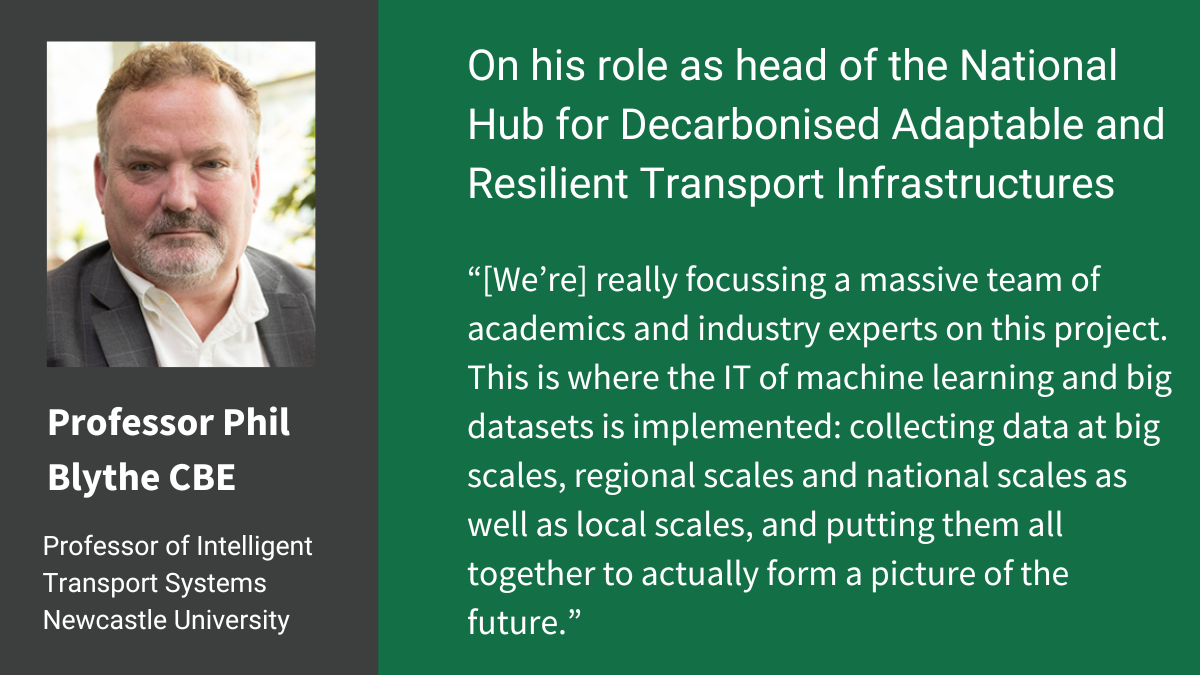
Phil Blythe is Professor of Intelligent Transport Systems at Newcastle University, Fellow of Royal Academy of Engineering, and heads up the Research Hub for Decarbonised Adaptable and Resilient Transport Infrastructures (DARe), launched in September 2023. As Principal Investigator on the newly-awarded national research hub, Phil has the challenge of working out how to upgrade and de-carbonise the UK’s national, regional and local transport infrastructure.
He says DARe is where the big data and the models really come in to make an impact on society: “Because there’s a lot of work on decarbonising transport systems and services and decarbonising infrastructure to some extent. Not so much on the resilience. So trying to put the two together is really interesting, because what you may think is good for decarbonising infrastructure and decarbonising transport systems such as electrification, may not actually be very good for resilience, for example, if you have electrification, resilience of the transport system may be less if you’re relying on just one fuel source which isn’t as distributed as fuel stations where you collect petrol and diesel.”
The hub brings together expertise in the UK from Newcastle, Heriott-Watt, Cambridge and Glasgow universities along with relevant stakeholders.
“We’re trying to bring the whole of the UK expertise together to understand this field and provide that advice to government.”
The climate
The group is also looking at the potential impact of climate weather changes on the transport systems and infrastructure. “There’s a whole bunch of sensing, trying to understand our infrastructures better, trying to understand the infrastructure’s interaction with things such as flooding, heat, wind, snow and the like.
“That’s really focussing a massive team of academics and industry at the moment. This is where the IT of machine learning, big datasets, collecting data at big scales, regional scales, even national scales as well as local scales, and putting this all together to actually form a picture of the future.
“We couldn’t have done this 20 years ago. I hope that will help make the UK more resilient to the future challenges of climate change and provide evidence both on where investment should go in the future, and also how decarbonising the infrastructure can actually maybe reduce the impacts of climate change through less heating of our planet overall.
“I think there will be a role for hydrogen in transport, a role for e-fuels and drop-in fuels. One of the reasons that Rolls-Royce and others have been arguing for small modular reactors is they could be used to generate e-fuels by sucking carbon out of the air and turning them into aviation fuels, and fuels for lorries and ships as well.
“The UK has some fantastic innovations in this space, we just need the opportunity to bring them to market and to demonstrate them at scale so that other countries and other parts of the world can learn from us and take some of our ideas and implement them there.”
Innovate UK and Graphene
Professor Sir Iain Gray, interviewed in January 2024
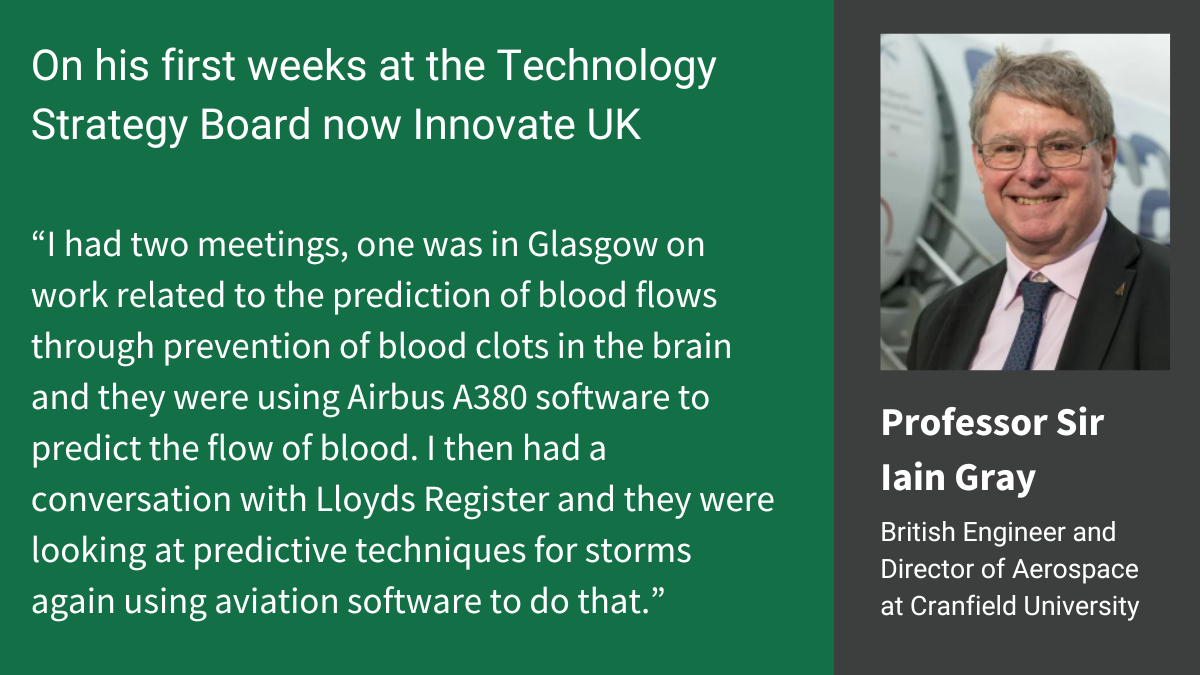
Professor Sir Iain Gray is Director of Aerospace at Cranfield University and has 27 years’ industry experience in the aerospace sector including roles at British Aerospace and BAE Systems.
He held various engineering positions before taking on the roles of Director of Engineering, then Managing Director at Airbus UK where he was involved in developing the double-decker Airbus A380 and was instrumental in the set-up of the Concorde Museum in Bristol.
He became the first Chief Executive of Innovate UK, the United Kingdom’s innovation agency, which provides money and support to organisations to make new products and services, following its establishment in 2007.
He says that having achieved a high-point of his career with the launch of the Airbus A380, and with the next big project being a ten year one, he felt it was the right time to leave.
Innovate UK sets out to use responsible innovation to take account of wider societal impacts and account for environmental and societal impacts to maximise long-term and sustainable economic growth.
Its mission statement says: “The societal impacts of early-stage technologies warrant particular attention. Society needs the improvements they can bring, but it is harder to foresee how their impact might play out in the future.”
When Sir Iain joined it was known as the Technology Strategy Board and the highlights he says were getting involved in other sectors and realising the transferrable skills that went from aerospace into healthcare, into energy and into automotive.
“My first four weeks at the Technology Strategy Board, I had two meetings, one was in Glasgow on some work related to the prediction of blood flows through prevention of blood clots in the brain and they were using Airbus A380 software to predict the flow of blood. I then had a conversation with Lloyds Register and they were very much looking at their predictive techniques for storms and again, they were using aviation software to do that. It was great getting to know and to understand the different sectors and from a tech point of view, understanding where you could learn from one sector and apply transferable skills into another.
“The other highlight was a slightly different look at things. Aerospace tends to be driven by the large companies, and TSB gave me exposure to the innovation, the entrepreneurial, the small business sector. To spend seven or eight years immersed in that kind of innovation, entrepreneurial community was amazing.
“With Innovate UK we came up with the notion of the Catapults and the Catapult Centres are still growing, they’re all £100 million businesses in their own right. I think Innovate UK gave it a broader umbrella than the title Technology Strategy Board.”
Cranfield University
In his role as Director of Aerospace at Cranfield University, Sir Iain gets to be at the forefront of some of the autonomous technology work, the work about drones, about eVTOL – Vertical Take-Off and Lift vehicles, very early thinking around battery electric aircraft and liquid hydrogen aircraft.
“It’s a sector that has started, through those technologies, to embrace the role of start-up companies and graduates, young business people can set up businesses in those sectors in a way that perhaps they never could in the seventies, eighties, nineties.
“The university’s been at the forefront of both a cultural change, a technology change and the environmental challenges the sector is facing up to, it’s a very responsible sector to those challenges and right through my career environment’s been pretty close to top of the agenda. It is now absolutely top of the agenda and universities have a huge role to play in ensuring both the social and technological changes necessary to meet the 2050 goals. It’s been incredibly exciting for me.”
Graphene
Iain has carried this experience and exposure back into his various non-executive roles. He says: “It exposed me to a different community and it made me (a) realise that I had something that I could offer back into that community, but (b) that I could live and breathe on the excitement and the enthusiasm and the dynamism of small start-ups that many big companies constantly try to emulate and find ways of emulating.
Iain is also involved with Versarien, which is developing graphene. He explains: “Versarien was one of the companies I came across when I was working at Innovate UK. Graphene is a very interesting product, it’s the world’s strongest material, and celebrates its ten-year anniversary this year (2024). It is one of those materials that has both electrical conductivity properties, strength properties that present great opportunities. But like a lot of materials there are qualification aspects, there are market aspects, it takes a long time for a new material, a new idea to become successful in the marketplace. Versarien is inching its way in terms of product development, focussing around things such as textiles and graphene in concrete, giving it additional strength properties, but ultimately will end up in very hi-tech products in aerospace, in communications, electrical devices, LCD kind of displays. It’s not a university, it’s a business and needs to find where its markets are now and that is where my Innovate experience comes to bear.”
Future
“In the world of aerospace the integration of drones into our airspace. I think will become part and parcel of our everyday life, delivery drones, last mile drones, drones for healthcare delivery, drones for surveillance. But all of that requires the integration of drones into our current airspace and that isn’t going to happen without significant evolution of using applied artificial intelligence for airspace management, for example.
“To meet the environmental challenges and goals we need the continued development of batteries, alternate fuels, hydrogen, I think there’ll be a huge agenda for hydrogen over the next twenty, thirty years. But where are we going to get all the electricity to electrolyze to produce the hydrogen. So the challenge of looking at things from a total system perspective is great.”
Data Making a Societal Difference and Industry Standard for Sustainability
Dr Rebecca Harding, interviewed in August 2022
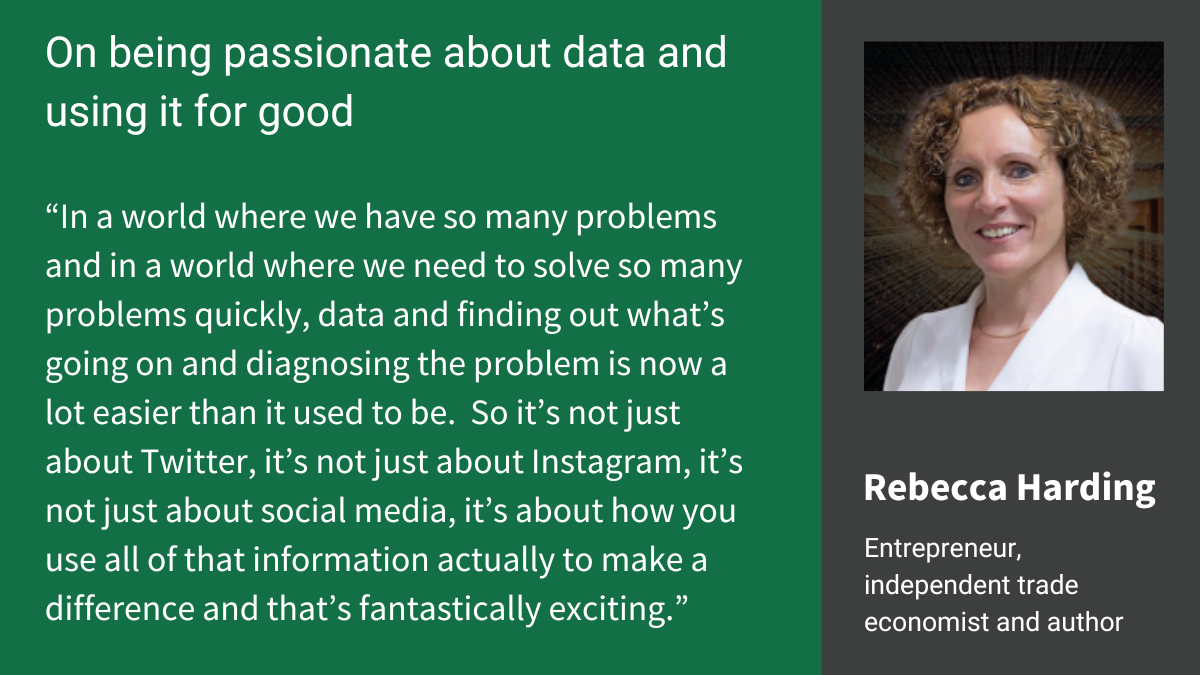
Dr Rebecca Harding is a technology entrepreneur, independent trade economist, author and Senior Fellow of the British Foreign Policy Group. She has built three data-based technology businesses in the data/fintech space within trade and trade finance and advises members of the All Party Parliamentary Group on Climate Security.
In November 2021 her company, Coriolis Technologies – a leading producer of data, analytics and insight into trade flows and supply chains – launched its Kosmos Working Group, which is a working group of banks, looking at developing a standardised metric for sustainability.
“One of my clients said wouldn’t it be wonderful if we could put a passport on every single transaction that we do for their Environment Social and Governance status (ESG) – can we do it? Think about the problem that that’s trying to solve, it’s absolutely colossal, it’s literally boiling the ocean.”
After giving this challenge some considerable thought and with insight from her ecologist husband, Rebecca decided that any process had to be automated, independent and scalable. She continues: “I decided to boil it down to something that is really, really, really simple to understand. Being an economist, I started with the fact that every single company has one thing in common, they buy or the sell a product or a service. Simple. If you can then match those goods or services over to sustainable development goals, which is how all of the ESG things are measured, then we can measure the ESG status of a company. I did some research and it turned out that the United Nations had already started that process of mapping products to sustainable development goals and every product in international trade has a code, and so you just match those codes over to sustainable development goals. Every sector has a code, so you match the products into the sector, and every sector has a record within the taxonomies for sustainability for certain types of activity.
“We put forward this idea that it was all based on products and services and their matches to the regulatory frameworks that were coming through and sustainable development goals. By December we had our first client and we’ve now got seventy banks within that framework looking to standardise measurements for sustainability using our product and our product approach and matching to sustainable development goals.”
Asked about pioneering this new standard for industry, Rebecca explains that it is a priority because it is often regarded as ‘too difficult’ to do. She continues: “Sustainability is an absolutely massive problem for everybody, we have to make a difference, we have to change things, but it’s all too easy to just say ‘it’s too difficult, let’s put it in the too difficult box, let’s focus on one thing’.
“It’s not enough. If you’re going to measure ESG (environmental, social, and governance) properly you have to look at a completely different way of measuring trade activity. It’s almost like back at the beginning of measuring national income, you had to measure something, you had to start with something that you knew in order to understand economic growth. Now we need to understand sustainable economic growth and we need to be able to measure it knowing that we’re measuring something meaningful. The products are meaningful. So if we can start to create a standard around that and scale it, then we can make life more complicated afterwards.
“For example, if I give you a red flag on something that you’re consuming, you’ll know that if you consume a lot of it you’re actually damaging the planet. That’s one of the ways that this can work. Equally, if you’re financing something where there’s a big red flag against it, then you know that you’re financing something that will damage the planet so you can start to manage that transition away. This is what we’re trying to do and that’s what’s important.”
“We are in the process of using satellite data to create a solution whereby we can geolocate climate incidents, human rights incidents, fraud, corruption or terrorism, and associate them with a postcode. The key thing at the moment is that everything is non-standardised. Our solution will apply anywhere in the world, and that’s the differentiator. It’s always consistent anywhere in the world.”
Rebecca says the International Chamber of Commerce is working on a similar framework to create guidelines for businesses. She adds: “They can set guidelines but they can’t recommend commercial solutions because they are an industry body, but they’re suggesting the same structure and providing it. What we’ve done is take that framework and put it into a technology. If the ICC guidelines become standard then ours is one of the solutions that’s already implemented it.”
“Right at the very beginning [with her company] Delta Economics – the clue’s in the name, Delta means change – the one thing I wanted to do was make economics and data useful, and it’s still a goal of mine.
“In a world where we have so many problems and in a world where we need to solve so many problems quickly, data and finding out what’s going on and diagnosing the problem is now a lot easier than it used to be. And so actually everybody has that capacity to be a diagnostician and to solve at their fingertips. So it’s not just about Twitter, it’s not just about Instagram, it’s not just about social media, it’s about how you use all of that information actually to make a difference and that’s fantastically exciting.”
Related stories
For more features like this, explore our Current Developments section.
